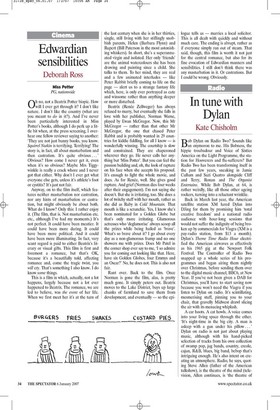Edwardian sensibilities
Deborah Ross Miss Potter PG, nationwide Qh no, not a Beatrix Potter biopic. How will I ever get through it? I don't like nature. I don't like the country (what are you meant to do in it?). And I've never been particularly interested in Miss Potter's books, although I do perk up a little bit when, at the press screening, I overhear one fellow reviewer saying to another: 'They are not just bunny books, you know. Squirrel Nutkin is terrifying. Terrifying! The story is, in fact, all about masturbation and then castration. It's quite obvious ... ' Obvious? How come I never get it, even when it's so obvious? Maybe Mrs Tiggywinkle is really a crack whore and I never got that either. Why don't I ever get what everyone else gets, unless it's athlete's foot or cystitis? It's just not fair.
Anyway, on to the film itself, which features neither masturbation nor castration, nor any hints of masturbation or castration, but might obviously be about both. What do I know? Only this: I rather enjoy it. (The film, that is. Not masturbation etc. etc., although I've had my moments.) It's not perfect. It could have been meatier. It could have been more daring. It could have been more political. And it could have been more illuminating. In fact, very scant regard is paid to either Beatrix's literary or visual gifts. This film is first and foremost a romance, but that's OK, because it's a beautifully told, affecting romance and, come the tragic twist, you will cry. That's something I also know. I do know some things.
This is a film in which, actually, not a lot happens, largely because not a lot ever happened to Beatrix. The romance, we are led to believe, was the event of her life. When we first meet her it's at the turn of the last century when she is in her thirties, single, still living with her stiflingly snobbish parents, Helen (Barbara Flynn) and Rupert (Bill Paterson in the most astonishing whiskers). In short, she's a superannuated virgin and isolated. Her only `friends' are the animal watercolours she has been drawing and painting since a child. She talks to them. To her mind, they are real and a few animated interludes — like Peter Rabbit briefly coming to life on the page — alert us to a strange fantasy life which, here, is only ever portrayed as cute and winsome rather than anything deeper or more disturbed.
Beatrix (Renee Zellweger) has always refused to marry, but eventually she falls in love with her publisher, Norman Warne, played by Ewan McGregor. Now, this Mr McGregor — rather than that other Mr McGregor, the one that chased Peter Rabbit and is probably wanted in 29 countries for kiddie fiddling, for all I know — is wonderfully winning. The courtship is slow and constrained. They are chaperoned wherever they go. He never calls her anything but 'Miss Potter'. But you can feel the passion building and, oh, the look of rapture on his face when she accepts his proposal. It's enough to light the whole movie, and does. As for Renee, well. She gives good rapture. And grief (Norman dies four weeks after their engagement). I'm not saying she doesn't. But she is irritating, too. She does a lot of twitchy stuff with her mouth, rather as she did as Ruby in Cold Mountain. That mouth is like a scrunchie. Yes, I know she's been nominated for a Golden Globe but that's only more irritating. Glamorous actresses who `deglamorise' always scoop all the prizes while being hailed as 'brave'. What's so brave about it? I go about every day as a non-glamorous frump and no one showers me with prizes. Does Mr Patel in the corner shop ever say to me, 'I so admire you for coming out looking like that. Here, have six Golden Globes, four Emmys and an Oscar?' No, he does not. This is also not fair.
Rant over. Back to the film Once Norman is gone the film, alas, is pretty much gone. It simply peters out. Beatrix moves to the Lake District, buys up large chunks of farmland to save them from development, and eventually — so the epilogue tells us — marries a local solicitor. This is all dealt with quickly and without much care. The ending is abrupt, rather as if everyone simply ran out of steam. That said, though, this film is worth it not just for the central romance, but also for its fine evocation of Edwardian manners and sensibilities. I still don't think there was any masturbation in it. Or castrations. But I could be wrong. Obviously.




































 Previous page
Previous page